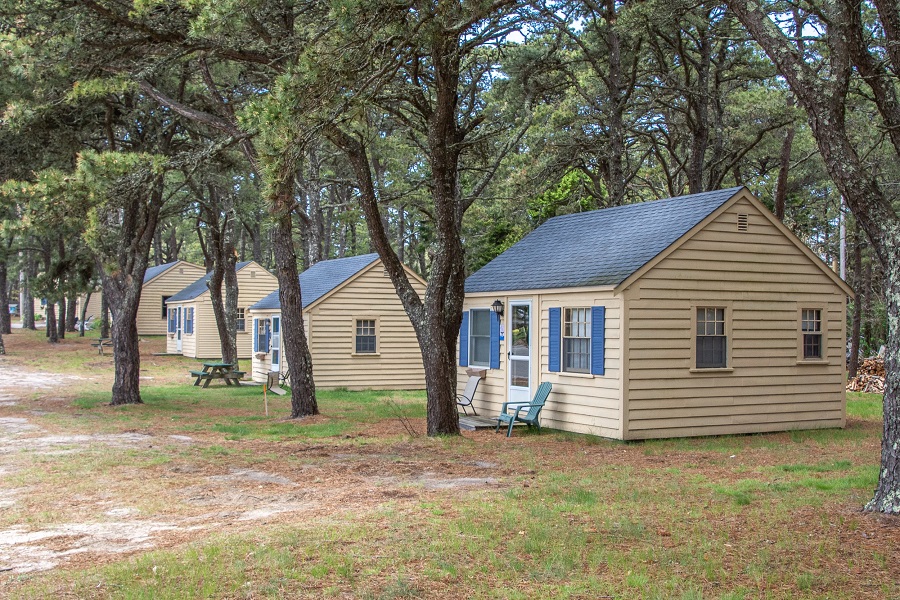WELLFLEET — The select board signed a purchase and sale agreement for the 21.25 acres at Maurice’s Campground last month, but town officials say there’s a lot to figure out before the Sept. 10 town meeting. That’s when voters will consider authorizing the $6.5-million purchase, seen as a step toward addressing the town’s lack of affordable housing.
Among the items is what to do about the estimated 35 cesspools on the property, and, if the town is to operate the campground for the coming years, how that business would be structured and managed.
“Part of what we have to do between town meeting and closing, in addition to education and outreach, is due diligence,” said Affordable Housing Trust chair Harry Terkanian during the first meeting of the campground working group on April 29.

The sale agreement came after a year of conversation with the three Gauthier brothers — John, Martin, and Maurice Jr. — whose parents founded the place as Ann’s Motor Court in 1949. The purchase is to include the office, four cottages, five cabins, a duplex cabin, the neighboring store, and 17 used trailers.
The working group includes 18 community members who’ve organized themselves into five subgroups to take on specific issues: infrastructure, waste disposal, operations, finances, and communicating findings with the public.
“We have to evaluate the financial information we get from the sellers so we can make sure we can operate the campground in a way that makes sense,” said Terkanian. “We have to develop a good understanding of the existing conditions so we know what we will be facing in repair costs. We have to address the septic system, which will be a little bit tricky.”
The agreement stipulates a six-year transition period, during which most of the property would still be used as a campground. That way, vacationers, employees, and locals who live on the site during the summer will have some time to find new living situations. The town must also honor a lease with a year-round tenant for the next three years. According to the contract, there are about five acres that could potentially be developed earlier.

The property at 80 Route 6 is assessed by the town at nearly $2.7 million. While the site never went up for sale, Gauthier said it garnered plenty of interest. He negotiated the $6.5-million price with the town — which he said was generous in comparison with nearby properties. For example, one acre of land at 4715 State Highway, 1.4 miles up the road, recently sold for $675,000.
If the purchase is authorized, the deal will close on Oct. 31, at which time health permits would need to be obtained. Analyses of the financials and existing conditions on the property are due by the end of June.
“That way, we’ll see what we are taking on and if we want to take it on,” said Terkanian. “We have the ability to opt out of the deal should we find those things to be unsatisfactory or too burdensome, or should we find something like a hazardous waste site on the property.”
If the voters authorize the purchase, a committee will be formed to plan future use of the property.
Five Working Groups
The five working groups will meet separately but convene every other Friday at Preservation Hall to discuss updates and findings over the next four months.
The finance subgroup is deciding whether to hire a certified public accountant to look at the finances prior to making an operations plan. “They’re digging into all the nerves,” said Kathleen Nagle of the Affordable Housing Trust, “and making sure it’s not a black hole.”
Many of the people in the working group aren’t sure the town should run the campground during the transitional period, but they still want to vet that option, Nagle said. The Gauthiers have agreed to consult with the town for at least 1,500 hours during the next year to ensure a smooth transition.
The septic system subgroup will look at the estimated 35 cesspools on the property. Cesspools, concrete pits that allow wastewater to flow directly into the ground, are automatically defined as “failed” septic systems and must be replaced by Title 5 systems when ownership of property is transferred. The group’s strategy is to seek a waiver from the board of health, which would allow the town to continue to operate the existing system for the six transitional years.
“It doesn’t make sense to design, build, and install a septic system to service what’s on the property now if it’s not going to be there 5, 6, 10 years from now,” Terkanian said. The cost to put in a compliant system could range from $10,000 to $50,000.
Making upgrades later also makes sense, Nagle said, because often affordable housing development opens the way to grant money to help fund such expenses.
The working group looking at the site’s infrastructure will release a report in the coming weeks after Building Inspector Jim Badera reviews the site. The town is considering connecting the property to Eastham’s water system, “which would make the property really appealing for housing,” said select board chair Ryan Curley.
The members of the committee are Curt Felix, Elaine McIlroy, Farrukh Najmi, Gary Sorkin, Harry Terkanian, Heather Doyle, Jay Norton, James Hood, John Wolf, Kathleen Nagle, Lara Henry, Michael DeVasto, Nancy Najmi, Roland Blair, Ryan Curley, Sarah Pechukas Slivka, Sharon Rule-Agger, and Susan Spear.
